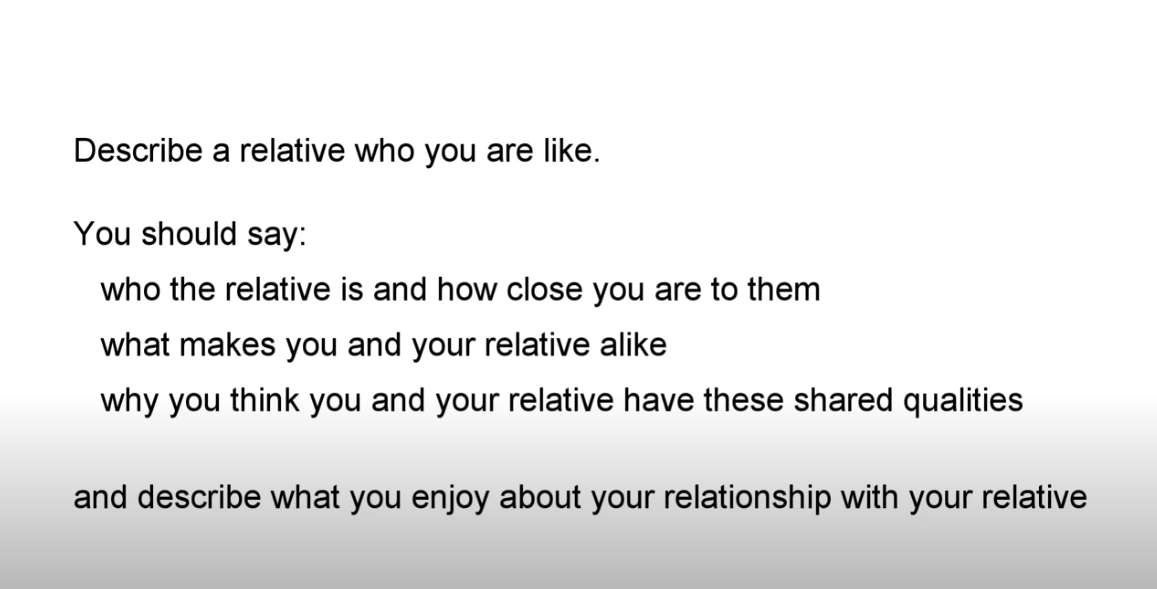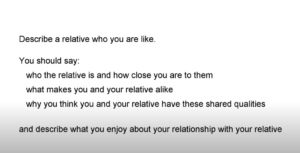IELTSのスピーキングパート2では、与えられた課題に対して、2分間のスピーチを行います。
スピーチ形式なので、テンプレートを使用した解答が可能です。この記事では、どのようにスピーチを組み立てるかなどの、パート2対策を、例題や解答例を元に紹介していきます。
IELTSスピーキング・パート2の概要
パート2では、まず始めに、試験官から Que card(トピックカード)が渡されます。
自分で話す話題を選ぶことはできませんが、テーマは、自分の経験や過去のエピソードなど、日常的な内容がほとんどです。
トピックカードを受け取ったら、試験官がストップウォッチで時間を計り始めます。
同時にメモと鉛筆も渡され、1分間考える時間を設けられます。
1分が経過したら、試験官からスピーチを始めるよう指示があります。
メモを取る際は、まず、自分の言いたいことを、思いついた順に、箇条書きにしましょう。ガイドラインを参考にしても問題ありません。また、メモは日本語でも英語でも、どちらを使っても構いません。
時間は1分間しか与えられないので、有効に活用し、スピーチに備えましょう。
トピックカード例
BUSINESS_TOPIC 1
Describe a skill you want to learn.
You should say:
What it is
• Why you think it is important
• How you are going to learn it
• What role it will play in your future
トピックカードに、箇条書きで書かれている3~4つの質問をガイドラインと言います。
この質問には必ずしも答える必要はありません。また、メモを読みながら回答することができ、試験官の顔を見て話す必要もありません。
パート2は、トピックの課題を、自分の好きなように発展させることができるパートなので、苦手意識を持つ受験者は多いですが、実は、練習を重ねると、攻略しやすく、スコアを獲得しやすいです。
スピーキング パート2の対策とコツ
パート2の解答のコツを紹介します。
制限時間内ギリギリまで話す
パート2の解答では、提示されたトピックについて、制限時間内ギリギリまで話し続けることが大切です。
時間を過ぎてしまい、途中で試験官に止められても減点にはなりませんので、短くなりすぎないように注意しましょう。
練習時からタイムを計測する
2分間ギリギリまで話せるように、普段の練習時から、ボイスレコーダーなどで時間を計測し、時間の感覚を定着させましょう。
1分30秒未満だと短すぎてしまい、試験官から話を続けるようジェスチャーで指示をされることもあります。
また、2分10秒を超えると、試験官からスピーチを止めるように指示を受けます。この時、違ったトピックに脱線していり、関係のないことを話を続けたりすると、減点につながりますので、十分注意しましょう。
内容を具体的に話す
時間をつなぐために、ただ同じことを繰り返してしまうと、内容のないスピーチと判断され、得点にはつながりません。
パート2解答で重要なコツは、「エピソードをストーリー風に話す」ことです。以下の例を見てみましょう。

Describe a skill you want to learn.



I’d like to learn computer skills.



I’d like to improve my knowledge of office software, such as Word, because I use it a lot at work.
この例のように、単純に「コンピュータースキル」と答えるのではなく、「ワードソフトなどの知識」などと具体化します。
答える項目ごとに、「なぜそう思うのか」を付け加えることで、理由がわかりやすくなり、内容も具体的になります。
目標スコア別のコツ
スピーキング目標スコア6.0
スピーキング6.0を目指している方は、沈黙に気を付け、流暢さを前面にだせるようにしましょう。
まずは、話す速度はゆっくりでもいいので、沈黙をなるべく少なく、止まらずに話せるように練習しましょう。
スピーキング目標スコア7.0
スピーキング7.0を目指している方は、流暢さだけでなく、話の一貫性と語彙力のアピールが必要になります。
話をポーズなく、スラスラと流暢に話し続けられるようになったら、専門的な単語や、イディオムを活用することで、スコアアップにつなげましょう。
効果的なメモの取り方
準備時間に、有用なメモを取ることも重要です。
メモを取る際は、文字だけではなく、記号も使用すると、1分間で多くの情報がメモできます。具体的であるほど好ましいので、なるべく思いつく限り、全てのことを書きましょう。
メモの例
以下に、質問例に対するメモの一例を紹介します。
- Love trying different cuisines
- Important bcz save money, invite friends, healthy, x go to restaurants everyday
- Going a good cooking school cls 🏠 variety of courses offered, Italian first, desert later,
- Cooking skills_ married_ provide healthy food for 家 and 子, or 親 for healthy living.
理由を考える
メモに対して、「なぜそう思うか」、理由を2つほど考えると、具体的にスピーチができます。
料理のスキルを学びたいのはなぜか? ➡ 様々な料理にトライするのが好き
重要なスキルであるのはなぜか? ➡ ホームパーティが開ける、レストランに毎日通うと破産する
🏠の近くの学校に通いたいのはなぜか? ➡ 様々なコース、イタリアンを先に、デザートもある
将来どのように役立つか? ➡ 結婚後に家族にもしくは自分に健康的な食事の提供
IELTS スピーキング パート2の例題と解答例
パート2の例題と、解答例を解説していきます。解答例は、高得点につながる、具体的な内容になっています。
「いつ、どこで、何を、どうした」という具体的な内容が組み込まれていますので、参考にしてください。
例題1
Describe an event you experienced in which you did not like the music played.
You should say:
What the event was
Where you were
What the music was like
And explain why you did not enjoy the music
解答例
I am going to talk about a music event I went to with my friend about a year ago .
We love listening to music and regularly exchange CD to get inspired from different musicians.
This particular festival is an annual event and very popular in Tokyo. The tickets were all sold out since many popular musicians were supposed to attend. We were very excited and our expectation was very high.
We enjoyed the beginning when several unknown rock bands were playing. However, some old songs were also played.
We are not really fans of traditional Japanese songs that the older generation particularly enjoys.
I thought the songs were boring and not inspiring at all. We ended up leaving halfway through the end.
Even though leaving the place, the songs were played in the event venue through the speakers placed everywhere.
The music lasted for 30 minutes or so. We could look around some exhibits and play games afterwards.
But I still remember the songs and how I felt about them. Now, we can laugh about the experience but at that time,we were very disappointed for the choice they made for the music in the event.
プラスとなる評価ポイント
この解答例では、「いつ、どこで、何を、どうした」がしっかりと述べられています。また、そのイベントの背景も提示されているので、どのようなイベントなのか、知らない人でもわかりやすく説明されています。
特にプラスとなるポイントは、感情的な表現をうまく取り入れている点です。
なぜがっかりしたのか、理由が理解でき、そして、最後にがっかりしたにも関わらず、今は笑い話として思い出されると、ポジティブな経験につなげられています。
例題2
Describe a time when you changed your opinion
You should say:
When it was
What the original opinion was
Why you changed it
And explain how you felt about it
解答例
I believe it is very difficult for certain people to change their mind. But I think it’s a lot better than being stuck and being stubborn. I have changed my opinions on numerous occasions, and I would like to share my view about history subject when I was in school.
I believed that learning history was a waste of time. It doesn’t teach us anything, and it simply takes time away from really useful subjects like science and math. But my history teacher opened my eyes to the marvellous world of history when I reached 10th grade. She linked each historical incident to the current situation.
She told us how policymakers and administrators could help navigate a specific situation by reading history or analysing historical data. If we pay attention to history, we can get answers to all questions we have. She has also shed light on our shared Japanese practises and our historical roots. It made me aware that history is not just the past, but our roots. Now, rather than condemn history education, I support the importance of learning history and I love it!
プラスとなる評価ポイント
このスピーチでは、適切な表現、語彙やイディオムを使用していることがポイントです。
内容も簡潔で、分かりやすく、トピックにフォーカスされていて、無駄がありません。
このように、あまり課題から逸れず、必要な内容を簡潔にわかりやすく述べることで、まとまりのあるスピーチになります。
例題3
Describe a short trip you often take but do not like
You should say:
Where you go
When you go there
Why you go there
And explain why you do not like the trip
解答例
A short trip that I often and regularly take is a trip to my grandfather’s home. I love to visit my grandparents, and I look forward to it, but I dislike the journey and its activities.
I go to a town called Shirahata in Chiba prefecture, which is 5 to 10 minutes away from where I live. I go there every weekend. I stay there for a day. I help my grandparents with banking work, buying groceries and vegetables, and visiting the doctors. I also help them pay their bills and clean their home. I take them to the park, and we also visit our place of worship together. I intend to spend quality time with them and help them in their household chores. I enjoy their company a great deal. However, I do not like to take these frequent short trips for many reasons. My grandparent’s home is dark and messy, and I feel uncomfortable there.
These trips are very tiring and stressful for me. I am trying to convince them to come and stay with us forever so that I can get rid of these irritating and tedious trips. But, they are very attached to their home, so they disagree with me.
I want to be with them, but I do not like the experience of going there at all.
プラスとなる評価ポイント
このスピーチは、感情表現を表す形容詞が多く使われており、自分の思いが明確に伝わっていることがポイントです。
何が嫌いで、何が好きなのか、具体的な都市の名前や、その行き来きの理由、アクティビティーについてもをはっきりと、明確に述べられています。
例題4
Describe a time when you got close to wild animals
You should say:
Where you were
What the animals were doing
Who you were with
And what your reaction was
解答例
I am going to talk about an animal, which I saw for the first time in the wild.
I saw a wild fox from a close distance. It was an adult fox that had greyish patches on its back. It was very skinny and seemed looking for some food in the ravine. The fox was completely oblivious of my existence. I am lucky that my house is located in the coutryside facing ravine and see wild animals from my room. When I saw the fox out of my window, I could not take my eyes off it first, because it was very cute and adorable. Nevertheless, at the same time, I was bit concern whether the fox was healthy because it was very skinny and small.
So, I hope the fox can survive without running over by car or any other accidents inflicted by us. I sometimes see a wild rabbit and even deer out of my window, too, so I am guessing the fox follows their prey and hunt these small mammals. I was very pleased to see it looking around food to eat. But I never feed or try to get very close to it. I think we should stay away from wild animals and never try to contact or touch them.
The reason is obvious. If we approach, wild animals most likely charge and become aggressive. It is natural defence and they think we are their threat. well, I do not put myself in the sutation and I am just happy looking at a wild animal in a natural setting that we cannot see so often in the city.
プラスとなる評価ポイント
このスピーチは、2分間ぎりぎりまで話せる、フルアンサーの解答になっています。
続詞をうまく活用することで、話の流れがバラバラにならず、エピソードと、そのバックグラウンドについて、全体的によくまとまっています。
例題5
Describe a piece of advice you recently received.
You should say:
What the advice was
and explain how you felt about the advice
When this happened
Who gave you the advice
解答例
音声も添付しましたので、スクリプトと併せて、参考にしてください。
I would like to describe a piece of advice that I recently received. This piece of advice is: “everything worth doing is worth doing poorly”.
This happened around three weeks ago and I actually saw it on the internet because it was someone’s Facebook post and I saw it and I thought it was a good quote so I memorized it. What this advice means is everything that is good to do is good to do even if you do a bad job. For example, let’s think exercise. A lot of people don’t exercise because they think it is too difficult or it takes too much time or money, or that it’s tiring. But what this post says is that it’s better to walk for ten minutes or do five push ups or just five sit ups than not exercise at all.
As another example, we can think about cooking. It’s better to buy groceries and cook a healthy meal at home even if you are not a good cook than to order fast food and waste money and eat unhealthy food, and I like this advice because a lot of healthy habits like reading, or studying, or exercising or thinking for yourself, I think, are very stressful to a lot of people because everyone wants to do it perfectly, but this piece of advice teaches me that building habits is about doing things every day and not perfectly
プラスとなる評価ポイント
このスピーチは、自分の意見について、2つの例を提示することで、より具体的に説明しています。
具体例を複数提示することで、論理的かつ、内容の一貫性をアピールすることができます。
まとめ
例題と解答例から分かるように、パート2のスピーチでは、ある事柄について、ストーリ―風に、具体的に述べることがポイントになります。
スコアアップに直結するポイントを、以下にまとめます。
- 感情を表す形容詞を活用する
- 聞かれていること以外のことは話さない
- エピソードの背景についても詳しく説明する
- イディオムや慣用句を活用する
- 要点が分かりやすいような話の展開を考える
- 話の流れが明確になるようい接続詞をうまく活用する
IELTS スピーキング パート2 の練習問題
パート2での頻出問題を、テーマごとにまとめました。練習用にご活用ください。
課題の中には、考えたこともないようなトピックについて、出題されているものもあります。
本番の試験でも、そのような質問に即座に解答することを求められるので、前もって課題をチェックし、考えをまとめておくとよいでしょう。
THINGS
| TOPIC 1 Describe a prize that you received You should say: ・What it was ・When you received it ・What you did for it And explain how you felt about it |
| TOPIC 2 Describe a photograph of you that you like You should say: ・Where it was taken ・When it was taken ・Who took it And explain how you felt about it |
| TOPIC 3 Describe a tradition in your country You should say: ・What it is ・Who take part in it ・What activities there are And how you feel about it |
PLACE
| TOPIC 1 Describe a home that you visited but did not want to live in You should say: ・Where it is ・What it is like ・Why you visited it And explain why you would not like to live there |
| TOPIC 2 Describe a part of a city or town you enjoy spending time in You should say: ・Where it is ・What it is like ・What you do there And explain why you enjoy spending time there |
PERSON
| TOPIC 1 Describe your favorite singer or band You should say: ・Who your favorite singer is ・What his or her personality is ・What kind of style his or her music belongs to And explain why he or she is your favorite singer |
| TOPIC 2 Describe a polite person you know You should say: ・Who he/she is ・How you knew him/her ・What he/she is like And explain why you think he/she is polite |
EVENT
| TOPIC 1 Describe a time when you saw children behave badly in public You should say: Where it was What the children were doing How others reacted to it And explain how you felt about it |
| TOPIC 2 Describe a polite person you know You should say: ・Who he/she is ・How you knew him/her ・What he/she is like And explain why you think he/she is polite |
| TOPIC 3 Describe an occasion when you forgot something important You should say: When it was What you forgot Why you forgot it And how you felt about it |
IELTS スピーキングパート2の例題と解答例 まとめ
IELTSスピーキングのパート2は、2分間のスピーチ形式で、1分間の考える時間を与えられます。この時間を有効に活用し、具体例を入れて話すようにしましょう。
例題とその解答例を参考に、パート2では解答をストーリー風に、具体的に話すよう心がけましょう。
普段の練習では、ボイスレコーダーを使用し、自分のスピーチを録音・確認しましょう。2分間ギリギリで話せているか、具体的な内容かどうか、フィードバックを行いましょう。
練習を重ねることで、時間の感覚や、頻出問題もわかってきます。練習は欠かさず行い、スコア獲得につなげましょう。
MAEでは実践的に学生さんたちに話す機会を与え、頻出問題を練習していきます。スピーキングにはスコアアップを寝られるコツがあるので練習をしながらコツを教えていきます。ぜひこの機会にIELTSのスピーキング対策をしっかり行いましょう。無料体験レッスンは随時受付しています。


IELTSスピーキング対策なら



